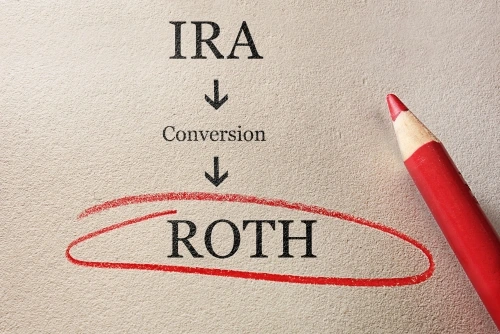A Roth conversion can feel like a simple move: shift money from a traditional IRA into a Roth IRA, pay the taxes now, and enjoy tax-free withdrawals later.
But here’s the catch: Taxes don’t exist in a vacuum.
A Roth IRA conversion can raise your taxable income for the year. Once that happens, it can create a domino effect: more of your Social Security benefits may become taxable, and your Medicare premiums may rise due to IRMAA surcharges.

If you’re in the Greater Raleigh area and weighing whether to convert to a Roth, the Raleigh CPAs at Steward Ingram & Cooper, PLLC, are sharing what you need to know to make informed financial decisions for your future.
Table of Contents
Understanding Roth IRAs vs Traditional IRAs
| Roth IRA | Traditional IRA |
|---|---|
| Tax Features | |
| Earnings: Grow tax-free | Earnings: Grow tax-deferred |
| Contributions: Made with after-tax dollars (not deductible) | Contributions: Made with pre-tax dollars (deductible if income-qualified) |
| RMDs: Not required during the account holder’s lifetime | RMDs: Required starting at age 73 |
| Withdrawals: Tax- and penalty-free withdrawals of contributions anytime. Earnings are tax-free if IRS-qualified. | Withdrawals: Taxable. Early withdrawals may incur penalties. |
| Income Requirements | |
| Eligibility: Must have earned income and fall within IRS income limits. 2023 phase-out:– Less than $153,000 (single) – Less than $228,000 (married filing jointly) | Eligibility: No income limits to contribute. For tax deduction eligibility, must meet IRS income limits. |
What a Roth Conversion Changes (and What It Doesn’t)
A Roth Conversion Does:
- Increase taxable income in the year of the conversion
- Potentially push you into a higher tax bracket
- Potentially increase the taxable portion of Social Security benefits
- Potentially increase Medicare premiums (Part B and Part D)
A Roth Conversion Does Not:
- Reduce your Social Security benefit amount
- Create Social Security “wages” or earnings
- Trigger a 10% early withdrawal penalty by itself (conversion ≠ withdrawal)
Common Questions You’re Right to Ask
- “Does a Roth conversion count as income for Social Security?”
- “How do Roth conversions affect Medicare premiums?”
- “Do you pay Social Security tax on a Roth conversion?”
These are the right questions to be asking—because while Roth conversions can be powerful tax-planning tools, they can also create unintended consequences if not timed and structured correctly.
Roth IRA Conversion Rules
A Roth IRA conversion happens when you transfer IRA retirement funds from a traditional IRA (or another eligible retirement account) into a Roth IRA. You’ll pay income tax on the amount converted, because you’re moving pretax retirement assets into a Roth account funded with after-tax dollars.
After that? The tradeoff kicks in:
- The Roth IRA offers tax-free growth
- Qualified distributions can be withdrawn tax-free later
For many retirement savings plans, that “pay taxes now, save future taxes later” idea is the whole point.
How Roth Conversions Are Taxed
A Roth conversion occurs in a single tax year, and the amount you convert is treated as ordinary income. That means it’s taxed at your normal income tax bracket—not long-term capital gains rates.
This means you’re choosing to:
- Pay income tax today on the converted amount
In exchange for:
- The ability to withdraw money tax-free in the future
That’s why the timing of conversions for retirement plans is a big deal. One year can be smooth, but another can result in a painful tax bill.
Can Roth Conversions Raise Social Security Taxes?

A Roth conversion is included in your adjusted gross income (AGI). That means it increases the “income” formulas used to determine whether your Social Security benefits are taxable.
In other words:
- It can cause more of your benefits to become taxable
- The conversion doesn’t reduce your monthly benefit
Does a Roth Conversion Count as Income for Social Security?
If your provisional income rises enough, you may move into the zone where:
- Up to 50% of benefits are taxable
- Or, up to 85% of benefits are taxable
Even if your Social Security benefits stay the same, taxes can climb.

Do You Pay Social Security Tax on a Roth Conversion?
This is a super common point of confusion. No, you do not pay Social Security tax on a Roth conversion. Social Security tax (FICA) generally applies to wages/self-employment income. A Roth IRA conversion gets the tax treatment of ordinary income for income tax purposes, but it is not earned wages.
This means:
- You may owe income tax
- You typically won’t owe Social Security tax on Roth conversion amounts
How Do Roth Conversions Affect Medicare Premiums?
Medicare looks at your modified adjusted gross income (MAGI). If MAGI rises above certain thresholds, Medicare applies IRMAA surcharges, meaning you pay more for Part B and Part D.
A Roth conversion can increase MAGI enough to:
- Trigger IRMAA
- Increase Medicare premiums (often for a full year)

Because Medicare uses a lookback (typically two years), the premium increase might not show up immediately. That delayed hit can be frustrating. If you’re doing a conversion at 63–64, for example, timing matters significantly.
When a Roth IRA Conversion Makes Sense
You’re In a Lower Tax Bracket
If you’re temporarily in a lower tax bracket, partial conversions can help keep you from jumping into a higher tax bracket.
You Have a Gap Year Before RMDs
The years between retirement and RMDs are often an ideal “planning lane.” You may have more control over taxable income during this time.
You Want to Reduce Future RMD Exposure
Lower traditional IRA balances can mean:
- Smaller required minimum distributions (RMDs)
- Less taxable income later
- Less pressure on Medicare premiums
You’re Thinking About Heirs
A Roth IRA can be a strong estate-planning tool because distributions to beneficiaries are often withdrawn tax-free (though timing rules still apply).
Downsides of Roth Conversions
The main downsides are usually tax-related:
- A bigger tax bill this year
- Pushing income into a higher tax bracket
- Triggering IRMAA and raising Medicare premiums
- Increasing taxation of Social Security benefits
- Underestimating conversion taxes because of the pro rata rule
Should I convert my IRA to a Roth after age 60?
Possibly, but it depends on:
- Your tax bracket
- Your expected retirement income
- When you’ll claim Social Security benefits
- When Medicare starts
- Whether large RMDs are likely later
Many people in their early 60s are in a temporary “sweet spot” where income is lower. However, if Roth conversions push you into higher tax brackets or trigger Medicare premium surcharges, a smaller, planned approach often works better than a large one-time conversion.
Can You Do Roth Conversions After Age 72?
Yes, Roth conversions are still allowed after age 72.
However, one important rule applies:
- You generally must take required minimum distributions first
- RMDs themselves can’t be converted
Once the required minimum distribution is satisfied, additional IRA funds can be converted to a Roth IRA in the same year.
Backdoor Roth Conversion (and the Pro Rata Rule)
High-income earners often ask about the backdoor Roth conversion.
This strategy usually means you:
- Contribute after-tax funds to a traditional IRA (non-deductible)
- Convert that IRA to a Roth IRA
The Pro Rata Rule
If you have other IRA funds (pretax) across traditional IRA, SEP, or simple IRA accounts, the IRS may treat part of the backdoor conversion as taxable, even if you used after-tax dollars.
This is where many “clean” conversions turn messy. A qualified tax advisor can help run the numbers before you accidentally create a bigger tax bill than expected.
Roth IRA Conversion FAQs
Does a Roth conversion count as income?
Yes. A Roth conversion is added to your taxable income for the year in which the conversion takes place.
Does a Roth conversion count as income for Social Security?
It doesn’t increase your Social Security benefit amount, but it can increase how much of your Social Security benefits are taxable.
How do Roth conversions affect Medicare premiums?
Roth conversions can increase your modified adjusted gross income (MAGI) and trigger IRMAA surcharges, raising Medicare Part B and Part D premiums.
Do you pay Social Security tax on a Roth conversion?
Usually, no. Roth conversions are subject to income tax, not Social Security payroll tax.
Can I reduce the tax hit by converting in smaller chunks?
Yes. Partial conversions spread across multiple years can help manage tax bracket exposure, Medicare premiums, and Social Security taxation.
How do Roth conversions interact with other retirement assets?
Roth conversions can reduce the size of tax-deferred retirement assets, which may help lower future required minimum distributions (RMDs) and overall taxable income.
Consult with a Raleigh-Durham CPA Today
At Steward Ingram & Cooper, PLLC, our tax advisors help individuals navigate complex retirement tax decisions, including Roth conversions in Raleigh, Durham, and Morrisville. Whether you’re planning ahead for Medicare premiums or optimizing your Social Security strategy, our tax planning and prep CPAs guide our clients with personalized advice based on our years of industry experience.
Since we take on a limited number of clients each year, you can inquire about our current availability and timeline by contacting us today. Call us at (919) 872-0866 or fill out the form below to get started.
Contact Form
We would love to hear from you! Please fill out this form and we will get back to you shortly.
